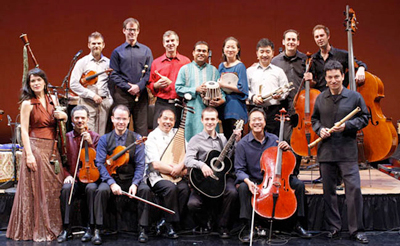by Alexandra Vago

Inspired by the ancient trade route between China and the Western world, The Silk Road Ensemble — a collective of some 60 performers and composers from over 20 countries — was founded around the idea of connecting the world through artistic exchange. Saturday evening’s performance, part of a 10-city tour in part to promote Silk Road’s sixth and latest record, Sing Me Home, brought 17 of the Ensemble’s members to Blossom.
Taking that recording as a springboard, the overarching theme for the evening encapsulated various concepts of “home.” The word itself elicits arrays of meaning — from our nostalgic glimpses of memory to our transient, physical dwellings and the many guideposts in between. These were illustrated beautifully by Wu Tong’s vocal rendition of the song Going Home in both Mandarin and English.
From beginning to end, the musicians captivated with their showmanship, their musicianship, and the genuinely reverent atmosphere they created. To open the concert, Cristina Pato (on Galician gaita or bagpipes) and Wu Tong (on suona, a Chinese double-reed instrument) performed their own composition, Fanfare for Gaita and Suona. The cross-cultural exchange of call and response was both musical and physical.
Indeed, the entire Ensemble showed a penchant for movement, their choreographed gestures providing strong visuals that complemented their subtler musical attributes, like a close attention to timbre. Playing the Iranian kamancheh, a spiked fiddle, Kayhan Kalhor at times produced sounds similar to a voice or a wind instrument.
At the heart of Silk Road are contrasting sounds drawing on traditions from around the world — as the Ensemble’s website puts it, “weaving together the foreign and familiar to create a new musical language.” Balancing together such different instruments as the strummed and plucked Chinese pipa and the grand, spirited bellows of the Galician bagpipes into a delicate ecosystem of sounds was nothing short of impressive.
Cellist Yo-Yo Ma, unassuming as always, stepped out into the spotlight on only a few occasions, including a solo stint in David Bruce’s Cut the Rug and an excerpt from Michio Mamiya’s Five Finnish Folk Songs. And as Syrian clarinetist Kinan Azmeh introduced the last piece of the evening, his own work titled Weddings, Ma playfully interrupted him to mention Azmeh’s own recent nuptials and to point out that the clarinetist’s parents were in the audience. Explaining his own feeling that love is a basic human right, Azmeh dedicated the performance to Syrians who have fallen in love in the past several years amidst war, turmoil, and bloodshed.
Other important contributions to the evening came from Jeffrey Beecher, bass; Nicholas Cords, viola; Sandeep Das, tabla; percussionists Haruka Fujii, Joseph Gramley, Shane Shanahan, and Mark Suter; violinists Johnny Gandelsman and Colin Jacobsen; Eric Jacobsen, cello; Kojiro Umezaki, shakuhachi; and Wu Man, pipa.
As an encore, Silk Road presented an interweaving of Prince’s When Doves Cry with musical quotes from Peter Gabriel — an interesting and poignant last touch on this bittersweet program.
Published on ClevelandClassical.com August 23, 2016.
Click here for a printable copy of this article



